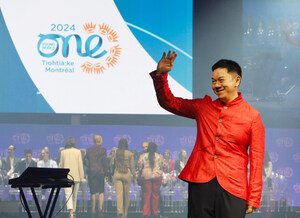World Leaders Urge China-U.S. Dialogue and Cooperation on Key Issues: Climate, Economic Recovery, and Trade.
HONG KONG, Jan. 19, 2022 /PRNewswire/ -- In what has been one of the most challenging years in the history of China-U.S. relations, and against the stark backdrop of the ongoing global pandemic, world leaders gathered virtually to urge a reconciliation between China and the United States on important global issues. Speaking at the "Beyond Differences, Towards Cooperation" forum hosted by the China-U.S. Exchange Foundation (CUSEF) and the China Center for International Economic Exchanges (CCIEE), speakers including Former President of Ireland Mary Robinson and Former Prime Minister of Singapore Goh Chok Tong, emphasized the need for China and the U.S. to work towards tackling key areas of cooperation such as climate change, economic recovery, and trade. Former Prime Minister of Canada Jean Chretien and Former Prime Minister of Japan Yasuo Fukuda also stressed the importance of U.S. and China cooperation.
In his opening remarks, Dr. Victor Fung, Vice Chairman of CUSEF, emphasized that despite the seemingly deteriorating political relations, China and the U.S. have remained highly interdependent economically as the U.S. remains China's largest export market and one of its largest trading partners. Dr. Fung identified two immediate priorities for bilateral cooperation, namely global economic recovery, and improving systems for sustainable trade and investment. He also noted that last month's rare joint pledge by both countries to reject a potential nuclear war and arms race marked a positive significant shift in communication.
In the first session of the forum entitled "U.S.-China Relations – Challenges and Next Steps", President Mary Robinson stressed the severity of China not meeting climate goals and emphasized the opportunity that renewables present for the country to deliver on decarbonization. At the same time, she stated that the "U.S. must also overcome its political deadlock to deliver on pledges already made, including concrete steps to reduce its emissions and accepting its fair share of the long-overdue $100 billion in climate finance to developing nations." Prime Minister Goh Chok Tong, suggested that the two countries "avoid conflict over differences, embrace healthy competition, and maximize cooperation."
Former Prime Minister of Canada Jean Chretien and Former Prime Minister of Japan Yasuo Fukuda, agreed that although there are many global issues that need to be solved and could potentially be solved with China-U.S. cooperation, it is important to look back on the significant progress that has been made in this relationship over the last few decades and remain optimistic that current issues can be overcome.
President of the National Committee on United States - China Relations Steve Orlins, emphasized that one of the biggest detriments to the relationship has been the increasing stifling of people to people, cultural, and social exchanges relations such as the restrictions of U.S. social media platforms in China and the denial of visas to Chinese students in the U.S. Instead of a 'tit for tat' approach, the two countries need to create "habits of cooperation" in the short term, such as the immediate removal of trade tariffs and agreeing on the definition of national security so that both sides can continue to do business and restart scientific cooperation, to name a few.
Despite the challenging period in diplomatic relations, Former Vice Premier of the State Council of China, Zeng Peiyan echoed that this relationship remains key to global success and stability especially when it comes to strategic issues going forward and should be underpinned by three principles: mutual respect, peaceful existence, and win-win cooperation. It is in the interest of both countries to actually strengthen cooperation especially when it comes to tackling the pandemic, climate action, trade, and technological innovation.
Following the state leaders' speeches was a panel discussion centered around global economic recovery. Former United States Secretary of the Treasury Jacob Lew and Executive Vice Chairman of CCIEE Bi Jingquan delivered key note speeches, followed by an expert panel discussion including, Stephen Roach, senior fellow at Yale University, Chinese University of Hong Kong Professor of Economics Lawrence Lau, Former Vice Minister of Foreign Affairs, People's Republic of China He Yafei, and professor and Former Dean of School of Economics and Management at Tsinghua University Qian Yingyi.
The second day of the forum will host panels on trade and investment, as well as the global supply chain. Panelists will include: Charles Boustany, Former U.S. House of Representatives, Craig Allen, President of the US - China Business Council, and John Zhao, Founder, Chairman of Hony Capital, Peter Wong, Non-executive Chairman of HSBC Asia Pacific amongst others. The third day of the forum will cover cooperation on climate issues and people and cultural exchanges, with speakers including: Helen Clark, Former Prime Minister of New Zealand, and Xie Zhenhua, China Special Envoy on Climate Change.
Note to Editors:
About the China - United States Exchange Foundation
The China-United States Exchange Foundation is an independent, non-profit and non-governmental foundation committed to the belief that a positive and peaceful relationship between the strongest developed nation and the most populous, fast-developing nation is essential for global wellbeing. https://www.cusef.org.hk/.
About the China Center for International Economic Exchanges
China Center for International Economic Exchanges, is a social organization and a new type of think tank. CCIEE aims to serve national development, improve people's welfare and promote exchanges and cooperation. www.cciee.org.cn.
Media contact:
CUSEF
[email protected]
SOURCE China-United States Exchange Foundation

WANT YOUR COMPANY'S NEWS FEATURED ON PRNEWSWIRE.COM?
Newsrooms &
Influencers
Digital Media
Outlets
Journalists
Opted In



Share this article